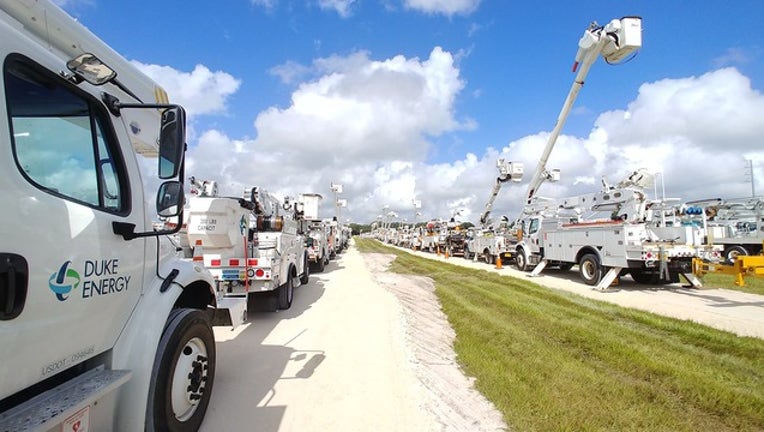Utility customers to get break amid pandemic

Duke Energy shared this photo of power crews preparing for a possible hit by Hurricane Dorian in September of 2019.
TALLAHASSEE - In what one regulator called a “no-brainer,” customers of four major utilities will get a break on upcoming electric bills as they grapple with the coronavirus pandemic.
The state Public Service Commission on Tuesday unanimously approved proposals that will lead to one-time savings in May for customers of Florida Power & Light, Duke Energy Florida and Gulf Power and savings spread over a longer period for customers of Tampa Electric Co.
“This is a truly a no-brainer for me, quite frankly, and I appreciate (the utilities) taking an early initiative to help their customers in such a time of need,” Commissioner Julie Brown said.
The savings stem from lower-than-expected costs for natural gas to fuel power plants. Utilities are required to pass along savings to customers when fuel costs drop, but the money typically goes to customers gradually.
Under the plans, FPL, Duke and Gulf will lump together fuel savings this year into one-time bill reductions in May, while Tampa Electric will provide chunks of the savings to customers from June through August and then smaller savings through the rest of the year.
RELATED: Duke Energy to cut customers bills in May; TECO to spread savings out over the summer
Utility officials said they wanted to accelerate the savings for customers dealing with job losses and other economic problems related to the coronavirus.
“Traditionally, these types of savings are spread out over the balance of the year. However, challenging times call for exceptional measures,” Eric Silagy, president and chief of executive officer of FPL, said in a statement after the commission vote. “I believe this one-time bill decrease is the most effective way to infuse customers with much-needed money as we all navigate through this difficult and unsettling time together.”
RELATED: Florida senator says "arbitrary" rules could explain 200k+ denied state unemployment claims
Jon Moyle, an attorney for the Florida Industrial Power Users Group, a coalition of large electricity users, also praised the plans.
“We think it’s a good day for consumers, including industrial consumers,” Moyle said.
While electric bills vary widely based on consumption and types of customers, utilities typically focus on a benchmark of residential customers who use 1,000 kilowatt hours of electricity a month.
Here are how bills would change under the plans, according to the Public Service Commission:
--- FPL residential customers who would typically pay $96.04 for 1,000 kilowatt hours of electricity will see bills of $73.36 in May.
--- Duke residential customers who would typically pay $129.74 for 1,000 kilowatt hours of electricity will see bills of $102.90 in May.
--- Gulf Power residential customers who would typically pay $140.43 for 1,000 kilowatt hours of electricity will see bills of $84.04 in May.
--- Tampa Electric residential customers who would typically pay $102.19 for 1,000 kilowatt hours of electricity will see bills of $78.82 a month in June through August and $97.69 a month in September through December.
While their rates are not regulated by the Public Service Commission, 21 public utilities throughout the state announced last week that they also plan to lower customer bills. They pointed to savings from lower-than-expected natural gas costs.
In a news release Tuesday, Tampa Electric said its reductions will total about $130 million.
RELATED: JetBlue to require customers to wear face coverings
“This pandemic has brought economic hardship to so many people; it is heartbreaking,” Nancy Tower, president and chief executive officer of Tampa Electric, said in a prepared statement. “This will allow Tampa Electric to provide immediate economic relief to our customers in the fastest way possible --- at a time when they need it most.”
Public Service Commission Chairman Gary Clark called the plans a “very strategic move on behalf of the utility companies.”
“These unusual and difficult times call for unusual and difficult measures,” Clark said.

